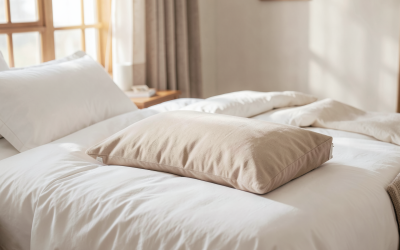Finding a way to improve your mental, physical and emotional well-being can have a huge benefit on your overall wellbeing in life. Meditation is one of the ways to achieve this, but taking meditative techniques to the next level can be difficult. One of the best tools for facilitating a healthier and more peaceful meditation practice is a meditation pillow. In this article, we’ll take a look at what a meditation pillow is, the benefits of using one, how to choose the perfect one for your needs, and how to make the most of your meditation time.
What is a Meditation Pillow?
A meditation pillow (also known as a zabuton cushion) is designed to provide a comfortable place for you to rest your body while meditating. It’s larger than most traditional pillows and provides a cushion between your body and the floor or chair you’re using to meditate. The purpose of a meditation pillow is to provide support so that you can stay comfortable during your entire practice without having to move or shift to keep your body feeling balanced and relaxed.
Benefits of Using a Meditation Pillow
Using a meditation pillow during your practice can help to create a more pleasant experience. It adds support and insulation so that you don’t have to rest your body directly on the floor, chair or bed. This can be particularly helpful for those with physical ailments who want to meditate but find it difficult to sit in certain positions or on certain surfaces. Additionally, it can help to reduce muscle tension and pain due to sitting for long periods as it allows for more distribution of body weight. Finally, its cushiony texture and shape also helps improve your posture and balance while meditating, which can be beneficial for overall well-being.
How to Choose the Right Meditation Pillow
When choosing a meditation pillow, there are a few things you should keep in mind. Firstly, consider the size and shape of the pillow. Your preferences will likely depend on the type of meditative practice you’re doing – some poses may require a longer, thinner pillow while others may need a more squat shape. Additionally, look at the type of material used in making the pillow; choose one crafted from natural fabrics such as cotton or linen as these absorb moisture to keep you cool during sweaty sessions.
Tips for Getting the Most Out of Your Meditation Pillow
Your meditation pillow can be used in various ways depending on your practice. Start by using your new pillow as part of your daily meditation routine so that you get used to it and your body adjusts accordingly. Place your pillow in different areas of your home or workspace so that you can enjoy your practice wherever you are. You can also create an extra layer of comfort by placing two pillows together or adding an extra cushion underneath. Finally, make sure to take care of your pillow by giving it regular airings and airing out or replacing the coverings if necessary.
Making the Most of Your Meditation Time
Meditation is an important part of any holistic health plan and should be approached as an opportunity to foster connection with yourself and the world around you. Establish a regular practice by setting aside a few minutes each day and choosing a comfortable spot to practice in either at home or even in nature. Make sure to take full advantage of the experience by switching up your environment and using soothing tools like music or aromatherapy to further relax into the practice.
Tips for Sustaining a Regular Meditation Practice
Sticking to a regular meditation practice can be difficult so it’s important to establish some strategies that will help keep you motivated. Start by setting realistic goals and tracking your progress to stay accountable. Additionally, establish some sort of reward system for achieving milestones so that you’re motivated each time you start a session. Additionally, if you’re having difficulties getting started or simply don’t have enough free time, consider trying out guided meditations which are an effective way to gain the benefits of meditation without having to take too much time out of your day.
The Impact of Stress Reduction on Well-Being
Reducing stress levels is an essential component of increasing overall well-being and it can easily be achieved through regular meditation practice. Meditation has been shown to reduce cortisol levels in the body which is beneficial for those looking for ways to manage their stress levels naturally. It has also been linked to improved focus and concentration which are key components of improved mental health, as well as improved breathing which has been linked to calming the nervous system.
Mindfulness and Its Benefits for Well-Being
The concept of mindfulness is all about coming into awareness sufficiently enough that you can observe thoughts and feelings without being caught up by them. Practicing mindfulness through meditation can have a positive impact on your mental health and wellbeing as it helps to reduce rumination and increase clarity and focus. Additionally, it can improve emotional regulation, increase resilience and improve sleep quality, all while creating self-compassion which is an integral component of overall well-being.
The Importance of Self-Care for Mental and Physical Well-Being
Self-care is an essential part of one’s journey towards mental and physical well-being. Taking time out to relax, spend time in nature, cultivate meaningful relationships with others, and really listen to your inner self is an important part of living a mindful life. Incorporating a meditation pillow into your practice is one way to cultivate self-care as it provides physical comfort which in turn boosts emotional wellbeing.



